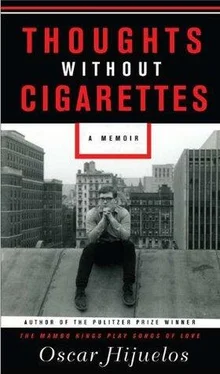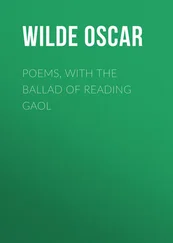And yet, come one Sunday — I do not recall the date; I think it was midmonth — my novel made it to the cover of the book review (the literary equivalent, in those days at least, of a musician getting on the cover of Rolling Stone ). The female critic could not have been kinder, despite the book’s high content of macho shenanigans, lauding the work as a great literary immigrant novel, the review accompanied by a dandy pen-and-ink illustration depicting a swirl of Cuban musicians shaking maracas and playing drums in a lively jam. I could not have missed it. For even if I wanted to avoid the subject — and a part of me wanted to — I would have heard about it anyway, for my agent, publicist, and editor, among others, called me as soon as they received the news. That was quickly followed (or preceded, as the Times book review could be had a week in advance) by a Friday review in the daily Times by the star-making/career-withering Michiko Kakutani, who gave me a high-toned rave, though, once again, for my wonderful immigrant novel. I was so naïve as to write both reviewers thankyou notes — as I would have done at the ad agency, where if someone looked out for you, some gesture of appreciation followed. I never heard back from either one of them.
Wonderful reviews in just about every newspaper in the country soon followed — literally over a hundred of them (for it was before the Internet killed the newspapers) within a two-week span. (The fifteen or so reviews I received for Our House , by comparison, were a drop in the bucket, and that book remained so little known that for years after, people assumed that The Mambo Kings was my first novel.) As much as I’d swear those reviews made no difference to me, I still put each carefully away in a box and occasionally took one or the other out to read over again, especially if it had spoken of my book in outsize terms. (Some implied that it was a modern American classic, certainly a breakthrough in terms of Latino literature in this country, and sometimes they actually admired the writing!) To further stroke my ego, Vanity Fair did a piece about me (and a review), accompanied by a photograph in which I happened to look somewhat smug and dapper, a cigarette burning in my hand. (The shoot, complete with a willowy and beautiful photographer, took place on the green behind the article writer’s brownstone on Sullivan Street: half-Cuban, Wendy Gimbel was one of the great early supporters of that book and of my later work.) And since a British edition would be coming out that following spring, I interviewed with a number of their magazines, even posed for a photographer from British Vogue . That same week I went down to a Soho studio and did an international radio broadcast alongside the Panamanian singer Ruben Blades, who, of Dutch ancestry, had a Cuban mother. That, along with the Beatles — the group that had inspired him to first become a musician — was our point of connection, though he had done a double take when my mind went blank after he’d told me that su mamá had come from La Regla, across the bay from Havana, even if I’d mentioned it in The Mambo Kings .
Then a New York Times article on me came out in the daily arts section. A certain Peter Watrous had come by to talk with me about the musical elements in the book, but what I had been mainly interested in was the fact that he played some guitar. Though it was not mentioned in the piece that resulted, he ended up staying in my apartment until a late hour, and we jammed.
As I had been booked on several big-time television programs, the Today show and Good Morning America among them, I had been urged to get contact lenses, but I simply couldn’t. I was so used to seeing myself in a certain way that the thick drowning-in-water lenses I’d always lived with had become, in effect, my eyes. (Or as I have often since thought, a buffer between myself and the world.) Instead I compromised and spent a small fortune on a pair of thin, specially treated antireflection lenses, cased inside a fancy French frame. (They cost about two and a half weeks of my pop’s old salary — that’s how far gone I had become.) Nevertheless, as one who had ducked out of any speech class, appalled at the notion of seeing myself captured on a video camera at Brandeis High School, the prospect of going on live national television somewhat terrified me.
Once I got down to the NBC studios at Rockefeller Center, however, a kind of nostalgia for homey old-time TV hit me, and, thinking of Ralph Kramden and Desi Arnaz (and how my pop had liked them), I almost calmed down, though never completely. I’d never worn so much makeup in my life, and it surprised me to see how my black interviewer, Bryant Gumbel, a true gent, appeared absolutely gray under the normal light. (Seeing him in that makeup, I could only think of funeral parlor cadavers.)
In any event, though I would not say that my first appearance was a disaster, I did distinguish myself by rolling my eyes around like BBs whenever Mr. Gumble asked a question that either discomfited me or seemed stupid. (“Why Cubans?”. . “Why Desi Arnaz?”) I also went through that broadcast with the feeling that my head was too big (“ mi cabezon ,” my mother sometimes called me) and, as I always have, felt a little jarred by the way some of the staff regarded me as I walked in, with an interior double take upon finding out that the balding, fair-skinned blond guy was the “Cuban-American” writer scheduled for the show. Sitting under the tremendously bright are lamps, I couldn’t help but check myself out in a monitor to my side. Accustomed to never really seeing my own eyes, I had no notion of just how well they would read through my new lenses — or how much I seemed a nervous beady-eyed jerk — but at least I could console myself with the fact that I had pupils that came across quite intensely on camera.
I went on a fifteen-or-so-city tour after that, reading at bookstores overflowing with people. The best of it was that I met some really nice Latinos and, among them (us) in every city, some Cubans, a long long way from home, Americanized exiles, professionals mainly, who, despite whatever bones they may have had to pick with that book — too much sex, or not anti-Castro enough, or too obsessed with the character’s pingas —appreciated my absolute love for Cuba. Though I met my share of dainty older Cuban women who thought parts of the book a little saucier than their conservative Catholic dispositions allowed them to enjoy, they too flooded me with something that I could never get enough of: affection — nothing too gushing but just enough to leave me with a tender feeling. And my American readers, if I may use the term? They were kind to me as well, no matter where I went traveling in the country. I found myself visiting many a fancy household, usually gatherings scheduled around my time off, in fairly opulent settings, local high society taking pride in hosting me as their guest. Occasionally, a musician, relating to my book for its insights about the profession, would turn up to make a gift of one of their recordings to me, or a beginner, wanting to break into the music scene, would ask my advice.
But I’d also encounter the sort of person who seemed disappointed when they met me. “I thought you would be swarthier, and more. . Ricky Ricardo,” someone actually told me. Or else they wanted to hear something different from a New York accent, or to see something in my body language and manner that was more distinctly Cuban. (Perhaps they wanted me to come out dancing the mambo or smoking a cigar in a white panama hat.) Sometimes I’d get hit up by a Latin American scholar, who, addressing me in ethnographic terms from the audience, wanted to turn my reading into a symposium about his knowledge of Cuba. Sometimes, a lefty, usually a super-liberal who had traveled to Cuba as a political tourist, or had gone there as a college student to chop sugarcane, would denounce my novel for failing to sing the revolution’s praises. I did my best to be polite, but it often pissed me off: I’d thank God that I could slip out the back and have a smoke. All along, of course, what else could I be but myself?
Читать дальше












